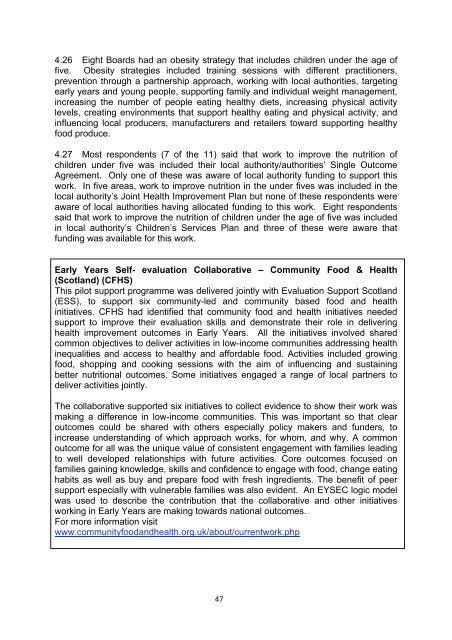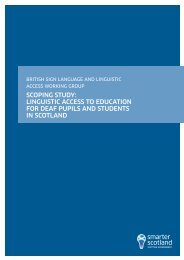Improving Maternal and Infant Nutrition: A Framework for Action
Improving Maternal and Infant Nutrition: A Framework for Action
Improving Maternal and Infant Nutrition: A Framework for Action
You also want an ePaper? Increase the reach of your titles
YUMPU automatically turns print PDFs into web optimized ePapers that Google loves.
4.26 Eight Boards had an obesity strategy that includes children under the age offive. Obesity strategies included training sessions with different practitioners,prevention through a partnership approach, working with local authorities, targetingearly years <strong>and</strong> young people, supporting family <strong>and</strong> individual weight management,increasing the number of people eating healthy diets, increasing physical activitylevels, creating environments that support healthy eating <strong>and</strong> physical activity, <strong>and</strong>influencing local producers, manufacturers <strong>and</strong> retailers toward supporting healthyfood produce.4.27 Most respondents (7 of the 11) said that work to improve the nutrition ofchildren under five was included their local authority/authorities’ Single OutcomeAgreement. Only one of these was aware of local authority funding to support thiswork. In five areas, work to improve nutrition in the under fives was included in thelocal authority’s Joint Health Improvement Plan but none of these respondents wereaware of local authorities having allocated funding to this work. Eight respondentssaid that work to improve the nutrition of children under the age of five was includedin local authority’s Children’s Services Plan <strong>and</strong> three of these were aware thatfunding was available <strong>for</strong> this work.Early Years Self- evaluation Collaborative – Community Food & Health(Scotl<strong>and</strong>) (CFHS)This pilot support programme was delivered jointly with Evaluation Support Scotl<strong>and</strong>(ESS), to support six community-led <strong>and</strong> community based food <strong>and</strong> healthinitiatives. CFHS had identified that community food <strong>and</strong> health initiatives neededsupport to improve their evaluation skills <strong>and</strong> demonstrate their role in deliveringhealth improvement outcomes in Early Years. All the initiatives involved sharedcommon objectives to deliver activities in low-income communities addressing healthinequalities <strong>and</strong> access to healthy <strong>and</strong> af<strong>for</strong>dable food. Activities included growingfood, shopping <strong>and</strong> cooking sessions with the aim of influencing <strong>and</strong> sustainingbetter nutritional outcomes. Some initiatives engaged a range of local partners todeliver activities jointly.The collaborative supported six initiatives to collect evidence to show their work wasmaking a difference in low-income communities. This was important so that clearoutcomes could be shared with others especially policy makers <strong>and</strong> funders, toincrease underst<strong>and</strong>ing of which approach works, <strong>for</strong> whom, <strong>and</strong> why. A commonoutcome <strong>for</strong> all was the unique value of consistent engagement with families leadingto well developed relationships with future activities. Core outcomes focused onfamilies gaining knowledge, skills <strong>and</strong> confidence to engage with food, change eatinghabits as well as buy <strong>and</strong> prepare food with fresh ingredients. The benefit of peersupport especially with vulnerable families was also evident. An EYSEC logic modelwas used to describe the contribution that the collaborative <strong>and</strong> other initiativesworking in Early Years are making towards national outcomes.For more in<strong>for</strong>mation visitwww.communityfood<strong>and</strong>health.org.uk/about/currentwork.php
















